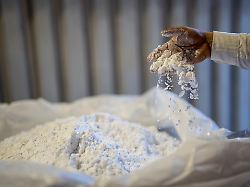Lithium is the most sought-after metal in the world. Although the raw material is not only found in Europe, but even in Germany, there is a high dependency on imports – especially from China. The search for alternatives is ongoing. They give no cause for euphoria.
In the technology dispute with the USA, China recently proved that even the second largest people’s republic in the world does not shy away from raw material controls. From August 1, companies exporting gallium and germanium products must apply for a license.
Fear then grew in the Ministry of Economic Affairs: What if China extends its export controls to other raw materials? Should lithium also fall under export controls, “then we really have a different problem,” warned Economics Minister Robert Habeck earlier this month.
The concern is no accident. Germany and Europe are almost 100 percent dependent on lithium imports. Although the raw material is mainly mined in South America, Australia and China, it is processed almost exclusively in the People’s Republic. The problem: The raw material is indispensable for the production of promising technologies. Among other things, it is a key raw material for e-mobility.
However, Michael Schmidt from the German Raw Materials Agency (DERA) is not currently assuming that China will expand its raw material controls to include lithium. “I think it’s relatively unlikely that China will pull its ace up its sleeve and also impose commodity controls on lithium.” However, China does have the market power to manipulate the price of the raw material. Either by putting more material on the market, or holding back lithium on purpose.
According to forecasts, global demand will exceed supply by 500,000 tons in 2030. According to Fastmarkets, 45 lithium mines were operational around the world last year. Eleven more are scheduled to open this year and seven more next year. According to experts, this pace is well below what would ensure an adequate global supply.
Own lithium deposits in Europe
“For far too long, the processing industry in Germany and Europe has relied on the fact that it can obtain its primary products in any quantity at any time at the lowest price on the world market,” criticizes raw materials expert Schmidt. The tide has turned at the latest as a result of the corona pandemic in recent years. Companies have to adapt to the new circumstances. “This works faster in small to medium-sized companies, which are more far-sighted and better positioned in their raw material procurement than in large corporations.”
And Europe certainly has its own lithium deposits. The reduction of the largest production volume is even planned in Germany. Starting in 2026, the startup Vulcan Energy wants to extract lithium from thermal water in the Upper Rhine Graben in Rhineland-Palatinate and Baden-Württemberg using a geothermal process that is particularly climate-friendly.
“Coupling the production of lithium to geothermal energy is a very innovative approach that has so far only existed in the USA on this scale,” says Schmidt. However, it remains to be seen whether the method is economically comparable or competitive with conventional extraction methods. Because at the end of the day it’s always about: How much does the product cost? And do companies want to afford it?
The raw materials expert estimates that the German-Australian newcomer to the raw materials business could cover around ten to twelve percent of the demand in Europe with its targeted 25,000 tons per year. However, he also points out that the innovative approach still leaves some scientific questions unanswered.
Irrespective of this, he is of the opinion: “We should use all potential to be less dependent on imports in Europe.” After all, raw materials from South America still covered incredible distances. “Every tonne that we produce in Europe and don’t have to import is of course a gain from an environmental point of view.”
Europe will always be dependent on imports
Lithium is now the most sought-after metal in the world. According to the International Energy Agency, the price has reached a volume of 320 billion dollars in 2022 – doubling within five years. Investments in critical minerals also rose in response – lithium saw the largest increase at 50 percent. According to Schmidt, this trend is a ray of hope and encouraging, but it should only be a start. “If the lithium demand in Europe is also to be covered from Europe, then an investment in the double-digit billions will be necessary,” he estimates. But mining exploration is a highly volatile business and thus far too risky for many investors.
In order to secure Europe’s supply of important raw materials, the EU countries want to further expand the domestic processing of the materials. At the beginning of July, the member states agreed that in future at least half of the annual consumption of the strategically particularly important raw materials should be processed in the EU. On the one hand, the rules for the supply of raw materials in the EU are intended to accelerate the conversion to a CO2-neutral economy. On the other hand, it should be ensured that the EU is not dependent on imports from individual countries for important raw materials.
The Federal Institute estimates that 25 to 30 percent of the demand can be covered with the projects that the German Raw Materials Agency considers feasible by 2030. “We will always be dependent on imports in Europe. We will not be able to achieve 100% self-sufficiency,” says Schmidt, dampening expectations. “There is no reason for euphoria at first. However, if we consider that we are currently still 100 percent dependent on imports, we can be quite optimistic.”
